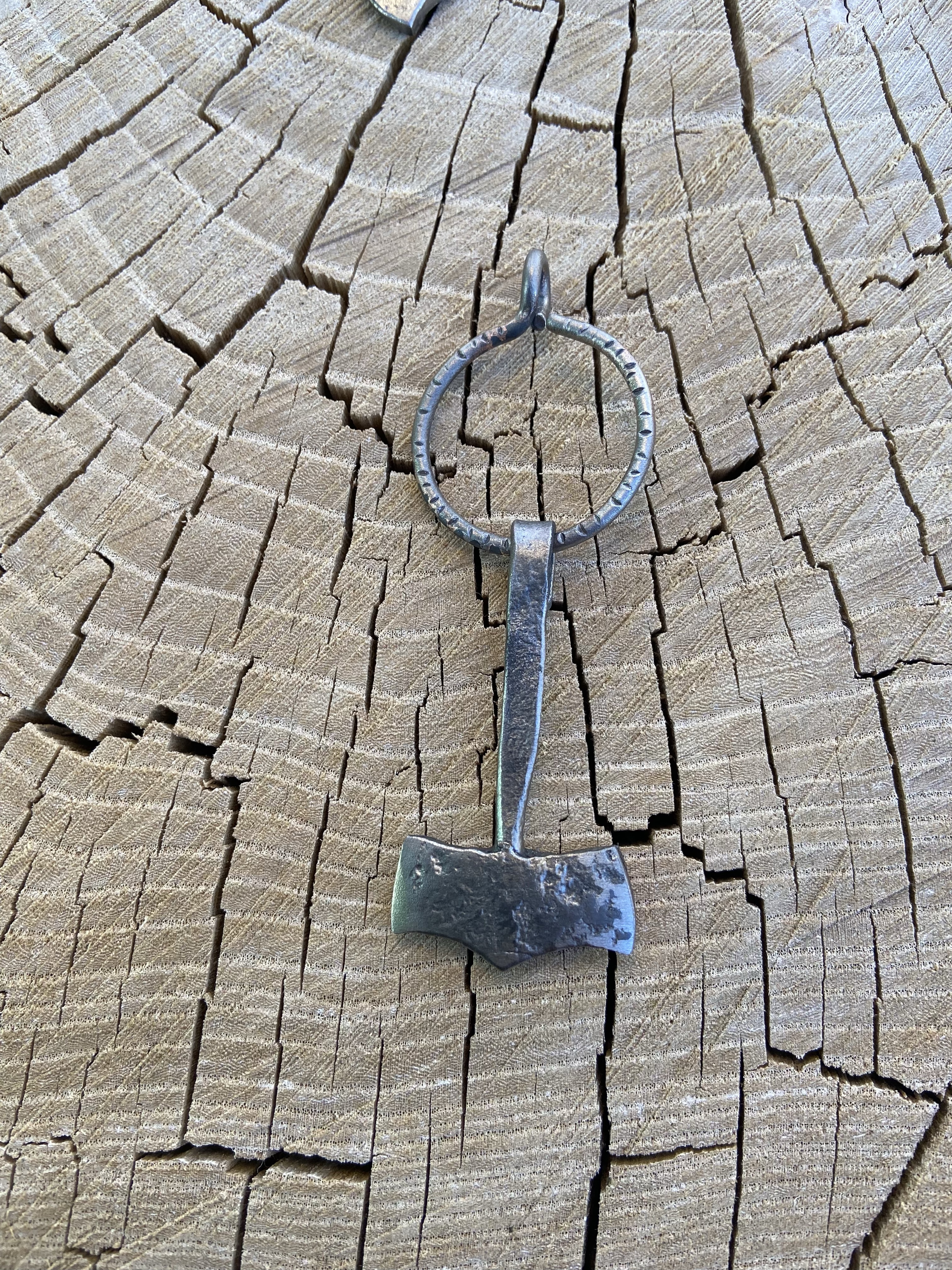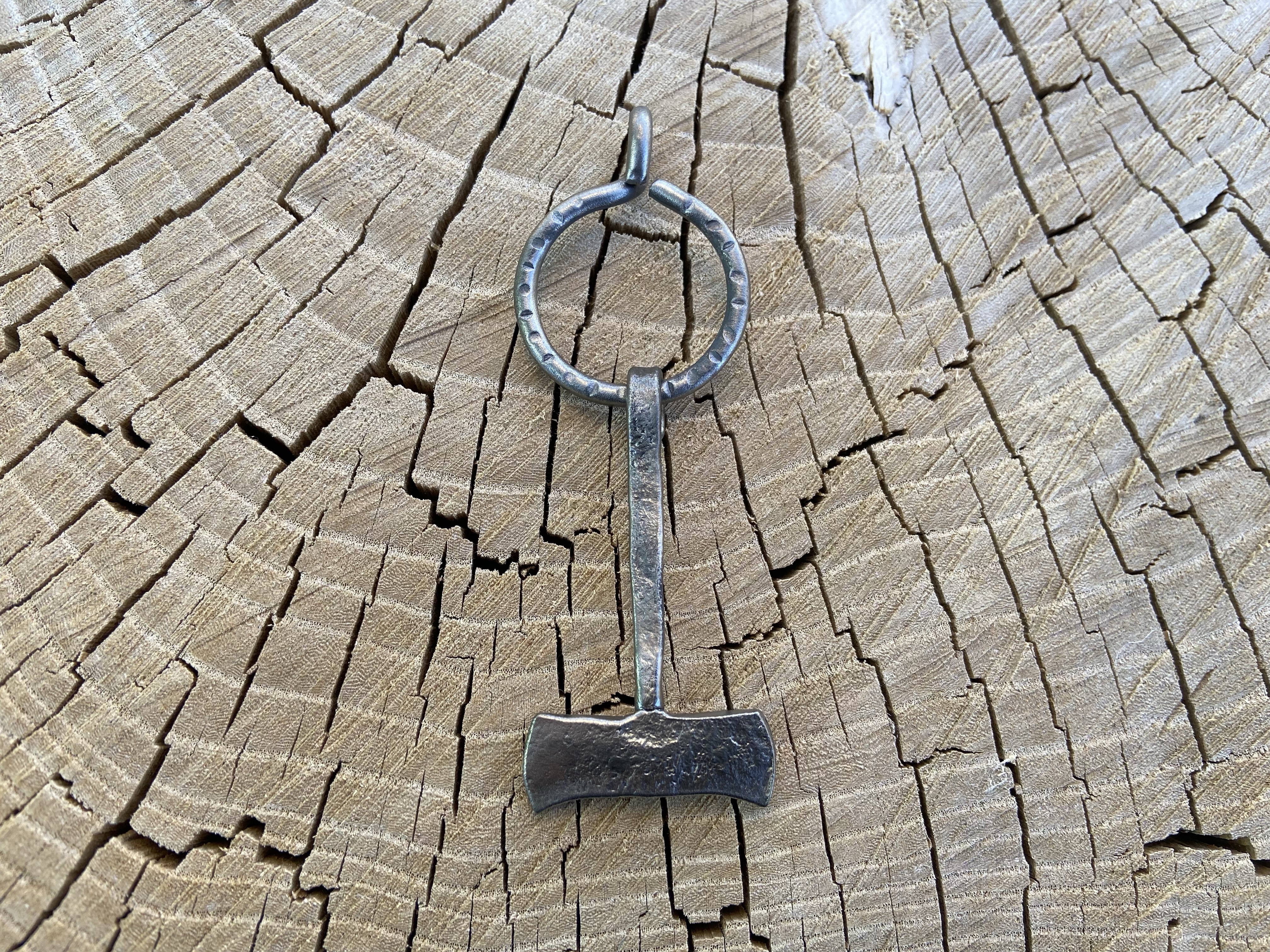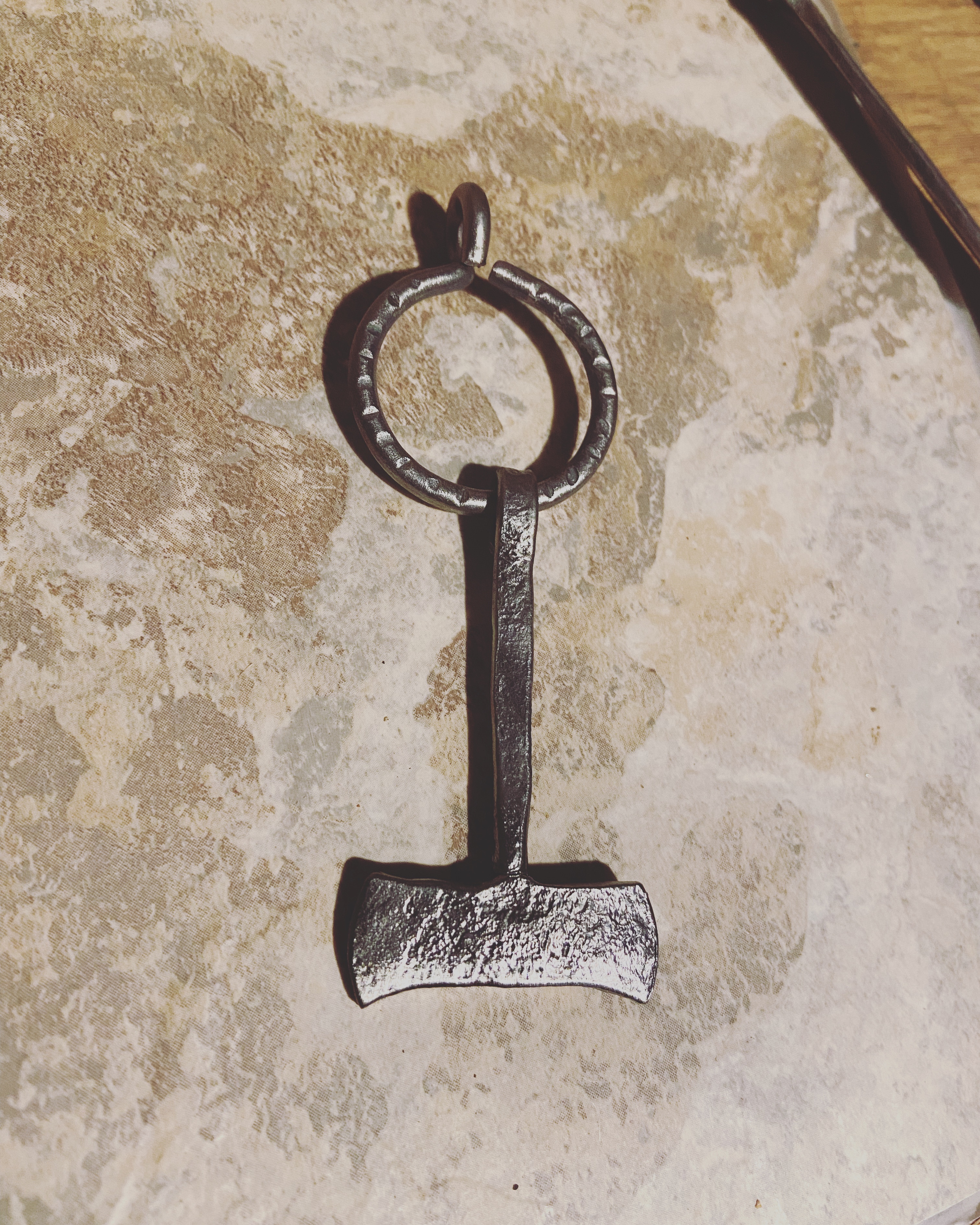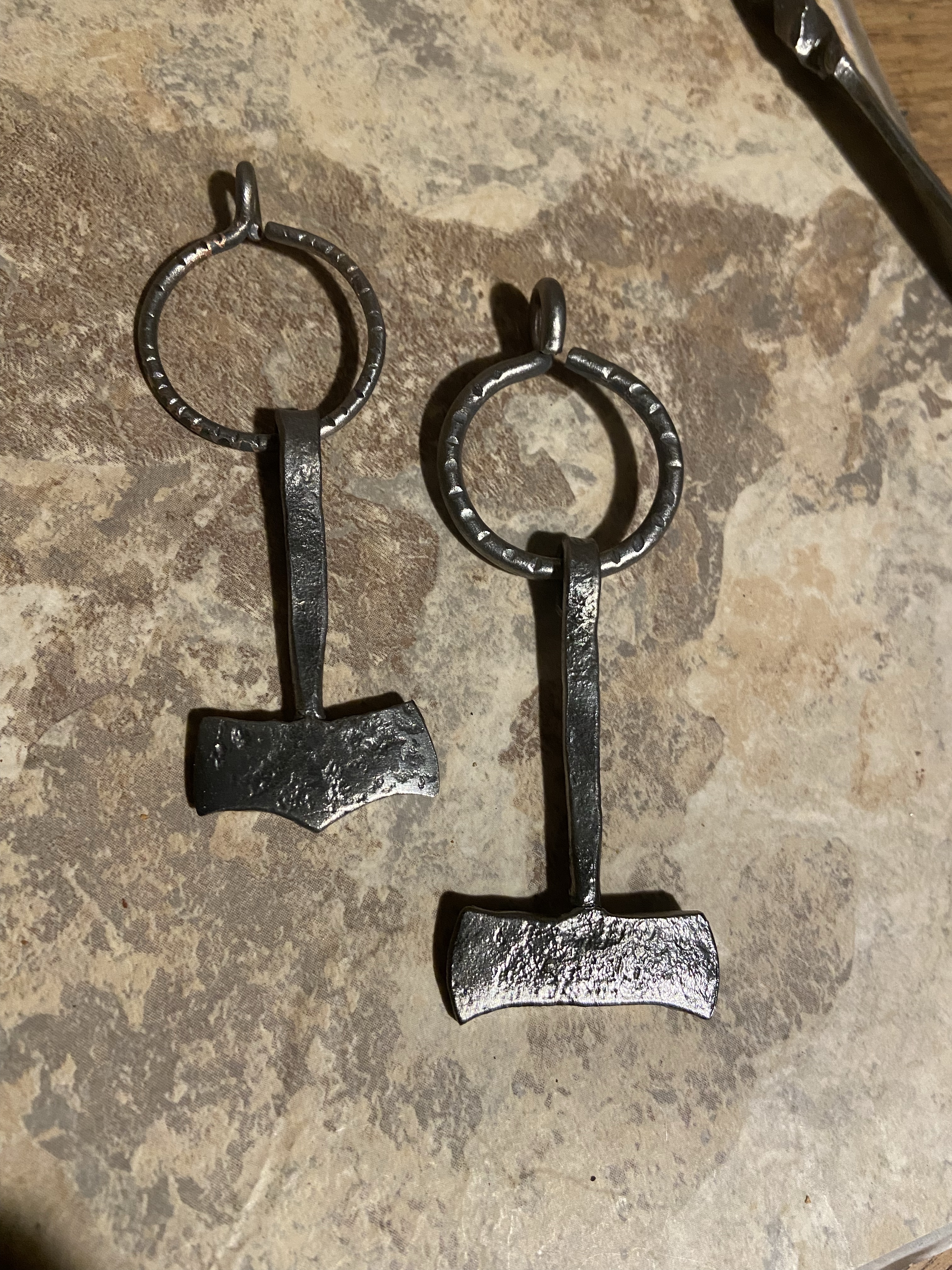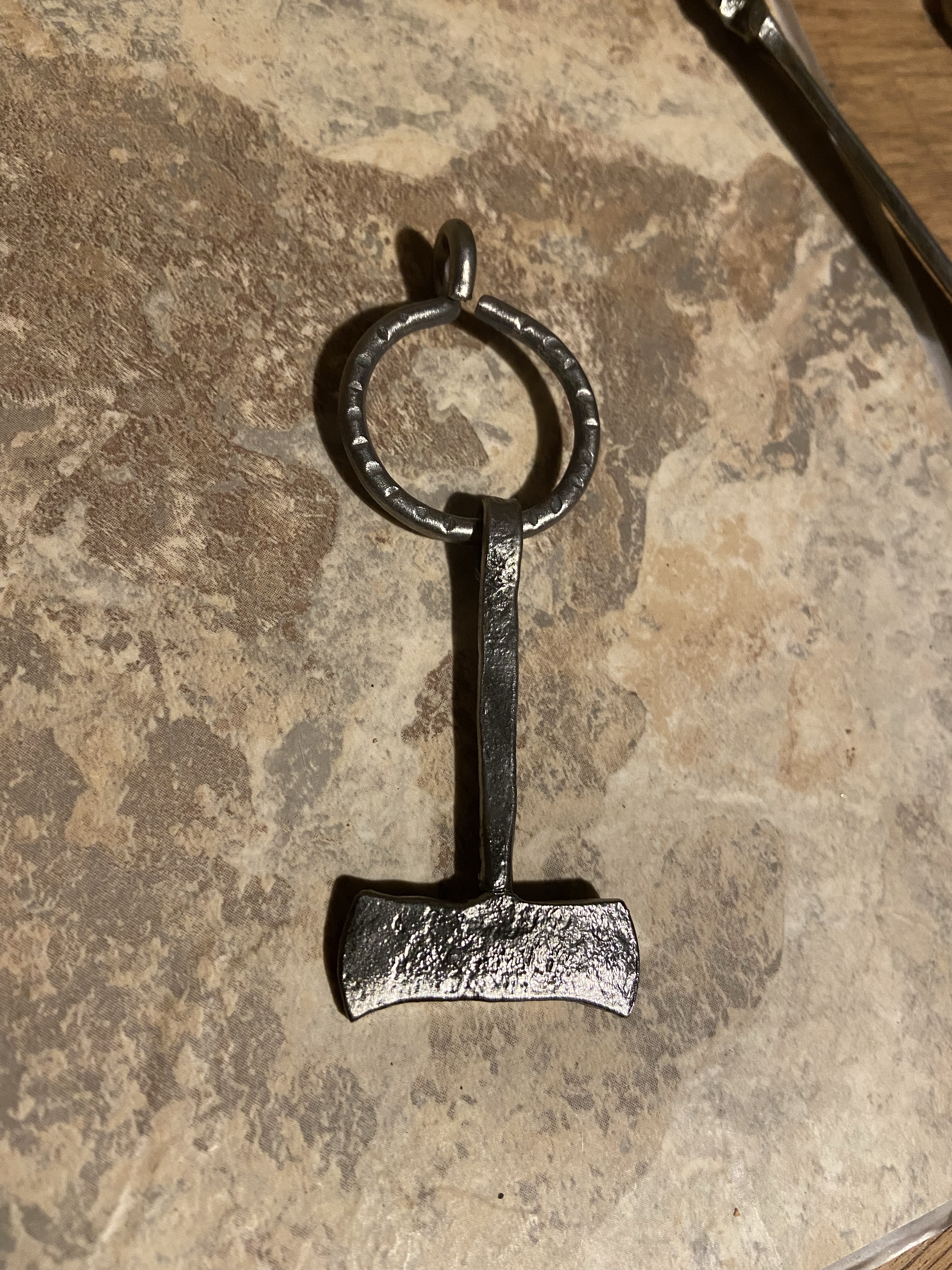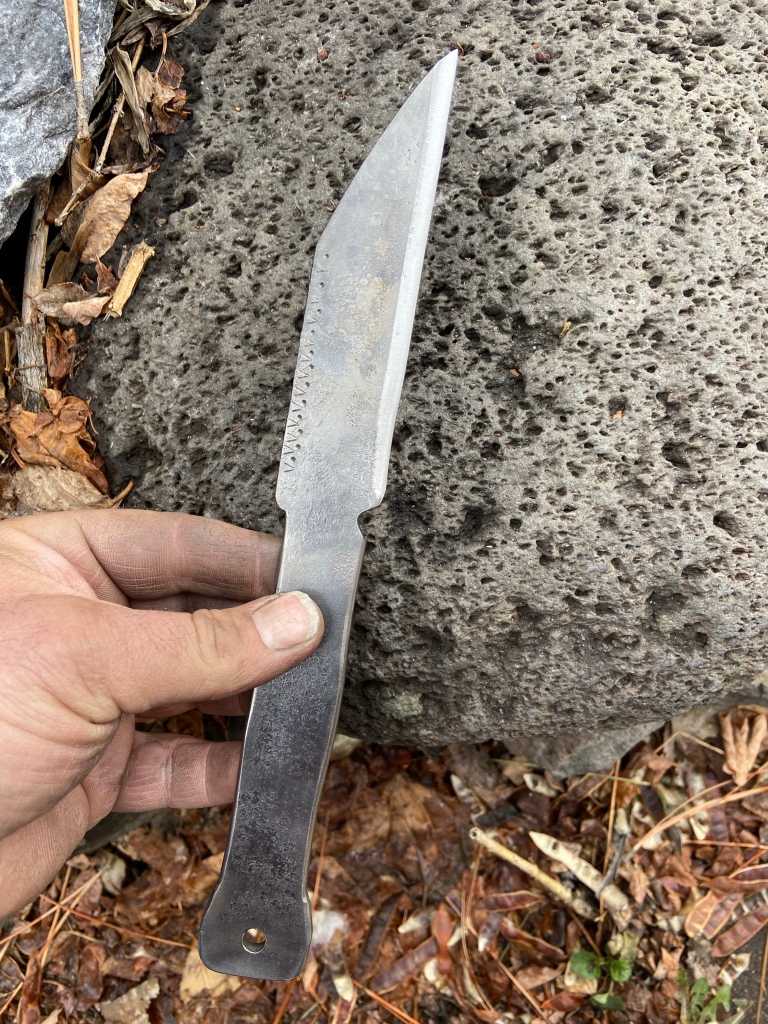Designs based on the Dithmarschen Mjölnir from Germany. Believed to be the oldest Hammer yet found. However the Kent is older. This hammer is characteristic of Saxon long hafts hammers.
Hroð-
February 21, 2022 | Categories: Ancient Germany , Ancient Northern Europe , Ancient Scandinavia , Anglo Saxon Frisian , Axe Culture , denmark , European Culture , Frisian , Knife making-Blacksmithing , Norð Sea , North Sea Coast , North Sea Germanic Jutland | Tags: Angles , Anglo Frisian , anglo saxon , Anglo Saxon Frisian , Blacksmith , blacksmithing , culture , denmark , england , English , german , Germanic , Germany , Heathen , history , iron work , Mjölnir , nordic , Norse jewelry , north sea , North Sea Germanic , northern europe , Northern Germany , Old English , Old English words , pagan , paganism | Leave a comment
1080 steel. Full steel design.
Hroð-
February 21, 2022 | Categories: Ancient Northern Europe , Ancient Scandinavia , Anglo Saxon Frisian , Anglo-Norda , Axe Culture , ænglisc , denmark , Eald Englisc , European Culture , Frisian , Knife making-Blacksmithing , Norse Culture , North Sea Coast , North Sea Germanic Jutland , old norse , vendel era | Tags: Angles , anglo saxon , Anglo Saxon Frisian , Anglo Saxon Seax , anglo saxon words , athame , Blacksmith , blacksmithing , coal forge , culture , dagger , denmark , england , English , forging , Germanic , Germany , Heathen , history , Indo-Europeans , iron , iron age , iron work , jutland , knife , Knife making , knives , midgard , nordic , norse , north sea , North Sea Germanic , northern europe , Northern Germany , Old English , old norse , pagan , proto Germanic , scandi edge , scandinavia , Scandinavian , seax , steel , sweden , Viking , Viking age , Viking Athame | Leave a comment
https://www.etsy.com/shop/NorseWest
After forever the forge is back in action. Trying to find a trip to Denmark/Germany. no customs just what is on here is available for now. Not back to knives yet. Hammer arm is a bit rusty yet.
Skål.
Hröð-
February 6, 2022 | Categories: Ancient Germany , Ancient Northern Europe , Ancient Scandinavia , Anglo Saxon Frisian , Anglo Saxon Runes , Anglo-Norda , Axe Culture , ænglisc , baltic , Balts , Celtic culture , denmark , Eald Englisc , Early Celts , English Runes , European Culture , Frisian , Futhorc/Futhark/Futhork , Knife making-Blacksmithing , Middle English , nature , Norð Sea , Norse Culture , North Sea Coast , North Sea Germanic Jutland , Old English , old norse , Proto Germanic Language , runes , Slavs , vendel era , West Germanic Language | Tags: angle , Angles , Anglo Frisian , anglo frisian runes , anglo saxon , Anglo Saxon Frisian , Anglo Saxon Runes , Anglo Saxon Word Of The Day , anglo saxon words , Angul , asatru , athame , Blacksmith , blacksmithing , celtic , coal forge , content , culture , denmark , earth , england , English , English Language , English Runes , futhark , futhorc , german , Germanic , Germany , Heathen , history , Indo-Europeans , iron work , jutland , Knife making , knives , midgard , nature , nordic , norse , Norse jewelry , north sea , North Sea Germanic , northern europe , Northern Germany , norway , Old English , Old English words , old norse , pagan , paganism , proto Germanic , runes , Runes of England , scandinavia , Scandinavian , seax , sweden , vendel era , Viking , Viking jewelry , witchcraft | Leave a comment
Hail,
Hröð-
October 15, 2021 | Categories: Ancient Germany , Ancient Northern Europe , Ancient Scandinavia , Anglo Saxon Frisian , Anglo Saxon Runes , Anglo-Norda , Axe Culture , ænglisc , denmark , Eald Englisc , English Runes , European Culture , family history , Frisian , Futhorc/Futhark/Futhork , Middle English , nature , Norð Sea , Norse Culture , North Sea Coast , North Sea Germanic Jutland , Old English , old norse , Proto Germanic Language , runes , vendel era , West Germanic Language | Tags: angle , Angles , Anglo Frisian , anglo frisian runes , anglo saxon , Anglo Saxon Frisian , Anglo Saxon Runes , Anglo Saxon Seax , Anglo Saxon Word Of The Day , anglo saxon words , Angul , asatru , athame , bronze age , content , culture , dagger , denmark , earth , england , English , English Language , English Runes , futhark , futhorc , german , Germanic , Germany , Heathen , history , Indo-Europeans , iron , iron age , jutland , knives , midgard , nature , nordic , norse , Norse athame , norse dagger , north sea , North Sea Germanic , northern europe , Northern Germany , norway , Old English , Old English words , old norse , pagan , paganism , proto Germanic , Rune of the day , runes , Runes of England , runic , scandinavia , Scandinavian , seax , steel , sweden , vendel era , Viking , Viking age , Viking Athame , wicca , wiccan , witchcraft | Leave a comment
Anglo Saxon word of the day:
ācweorna (squirrel)
The first denotes “oak” the second element “weorna “ denotes squirrel.
Proto-West Germanic: *aikwernō
Bonus:
maniġfeald (manifold, many fold, of many parts)
Old English: maniġfeald, mæniġfeald
Hröð-
July 12, 2021 | Categories: Ancient Germany , Ancient Northern Europe , Ancient Scandinavia , Anglo Saxon Frisian , Anglo Saxon Runes , Anglo-Norda , Axe Culture , ænglisc , denmark , Eald Englisc , English Runes , European Culture , Frisian , Futhorc/Futhark/Futhork , Middle English , Norð Sea , Norse Culture , North Sea Coast , North Sea Germanic Jutland , Old English , old norse , Proto Germanic Language , runes , vendel era , West Germanic Language | Tags: angle , Angles , Anglo Frisian , anglo frisian runes , anglo saxon , Anglo Saxon Frisian , Anglo Saxon Runes , Anglo Saxon Word Of The Day , anglo saxon words , Angul , Blacksmith , content , culture , denmark , earth , england , English , English Language , English Runes , futhark , futhorc , german , Germanic , Germany , history , Indo-Europeans , jutland , midgard , nordic , norse , north sea , North Sea Germanic , northern europe , Northern Germany , norway , Old English , Old English words , old norse , pagan , proto Germanic , Rune of the day , runes , Runes of England , runic , scandinavia , Scandinavian , sweden , vendel era , Viking | Leave a comment
Lots of spiritual information but in a good format.
Hroð-
July 7, 2021 | Categories: Ancient Germany , Ancient Northern Europe , Ancient Scandinavia , Anglo Saxon Frisian , Anglo Saxon Runes , Anglo-Norda , Axe Culture , ænglisc , denmark , Eald Englisc , Early Celts , English Runes , European Culture , Frisian , Futhorc/Futhark/Futhork , Middle English , nature , Norð Sea , Norse Culture , North Sea Coast , North Sea Germanic Jutland , Old English , old norse , Proto Germanic Language , runes , vendel era , West Germanic Language | Tags: angle , Angles , Anglo Frisian , anglo frisian runes , anglo saxon , Anglo Saxon Frisian , Anglo Saxon Runes , Anglo Saxon Word Of The Day , anglo saxon words , Angul , asatru , bronze age , culture , denmark , earth , england , English , English Language , English Runes , futhark , futhorc , german , Germanic , Germany , Heathen , history , Indo-Europeans , jutland , midgard , nordic , norse , north sea , North Sea Germanic , northern europe , Northern Germany , norway , Old English , Old English words , old norse , pagan , paganism , proto Germanic , Rune of the day , runes , Runes of England , runic , scandinavia , Scandinavian , seax , sweden , vendel era , Viking , Viking age | Leave a comment
Anglo Saxon word of þe dæg:
ūhta (pre dawn) (last part of night)
Old English: ūht (< *unhtwaz), ūhta (< *unhtwô)
Bonus:
Lagustrǣt (ocean) literally “Water-road”.
Old English: strǣt, strēt
And
West Germanic: *lagu
Hroð-
July 2, 2021 | Categories: Ancient Germany , Ancient Northern Europe , Ancient Scandinavia , Anglo Saxon Frisian , Anglo Saxon Runes , Anglo-Norda , Axe Culture , ænglisc , denmark , Eald Englisc , English Runes , European Culture , Middle English , Norð Sea , Norse Culture , North Sea Coast , North Sea Germanic Jutland , Old English , old norse , Proto Germanic Language , runes , vendel era , West Germanic Language | Tags: angle , Angles , Anglo Frisian , anglo frisian runes , anglo saxon , Anglo Saxon Frisian , Anglo Saxon Runes , Anglo Saxon Word Of The Day , anglo saxon words , Angul , bronze age , culture , denmark , england , English , English Language , English Runes , futhark , futhorc , german , Germanic , Germany , Heathen , history , Indo-Europeans , iron age , jutland , midgard , nordic , norse , north sea , North Sea Germanic , northern europe , Northern Germany , norway , Old English , Old English words , old norse , pagan , proto Germanic , Rune of the day , runes , Runes of England , runic , scandinavia , Scandinavian , seax , sweden , vendel era , wild hunt | Leave a comment
Hilda Roderick Ellis Davidson is quickly becoming a favorite author of mine. Great detail and everything kept in context. I do love comparatives though I am biased.
Hrøð-
July 1, 2021 | Categories: Ancient Germany , Ancient Northern Europe , Ancient Scandinavia , Anglo Saxon Frisian , Anglo Saxon Runes , Anglo-Norda , Axe Culture , ænglisc , Celtic culture , denmark , Eald Englisc , Early Celts , English Runes , European Culture , Frisian , Futhorc/Futhark/Futhork , Knife making-Blacksmithing , Middle English , Norð Sea , Norse Culture , North Sea Coast , North Sea Germanic Jutland , Old English , old norse , Proto Germanic Language , runes , vendel era , West Germanic Language | Tags: Angles , Anglo Frisian , anglo saxon , Anglo Saxon Frisian , Anglo Saxon Runes , Anglo Saxon Word Of The Day , anglo saxon words , baltic , bronze age , celtic , Celtic mythology , celts , culture , denmark , england , English , English Language , English Runes , futhark , futhorc , german , Germanic , Germany , Heathen , history , Indo-Europeans , iron work , jutland , midgard , nordic , norse , north sea , North Sea Germanic , northern europe , Northern Germany , norway , Old English , Old English words , old norse , pagan , paganism , proto Germanic , runes , Runes of England , runic , scandinavia , Scandinavian , sweden , vendel era , Viking , Viking age , wild hunt , witchcraft , yUle | Leave a comment
Anglo Saxon ƿord of þe dæġ: (Hægtesse)
ᚨᚾᚷᛚᛟ ᛋᚨᛉᛟᚾ ᚹᛟᚱᛞ ᛟᚠ ᚦᛖ ᛞᚨᚷ᛬
ᚺægtesse (Witch, Demon, Harpy, Fury, Negative female spirit) although it has reduced in Modern English to mean a evil or ill spirited old woman, it actually is directly cognate to German “Hexe” (Witch) (Skillful, Crafty). From Proto Germanic “hagatusjō” from PG “Hagaz” (Skillful/Crafty) and “Tusjō” (Witch). ᚺᚨᚷᛏᛖᛋᛋᛖ᛬
Compare:
West Germanic: *hagatusi
Old English: hægtesse, hægtes, hegtes
Middle English: hagge, hegge
English: hag
Old Frisian: *hegtesse, *hexe
Saterland Frisian: Häkse
West Frisian: hekse
Old Saxon: *hagatusia
Middle Low German: *hagetusse
Plautdietsch: Hakjs
Norwegian: haugtusse, haugtuss
Old Dutch: *hagatissa
Middle Dutch: hagetisse
Dutch: hagedis (dialectal)
Old High German: hagazussa, hagzissa, hāzus
Middle High German: hecse
German: Hexe
Polish: heks
Danish: heks
Dutch: heks
Swedish: häxa
Luxembourgish: Hex
————————————
Bonus:
Hliþ-Hlið (Slope/Incline) from Proto Germanic “hliþą”. ᚺᛚᛁᚦ.
Interestingly Hliþ is in the Old Norse compound “Hliðskjalf” which is the name of Woden’s throne. Translated to something like “shivering/tottering/shaking slope'” Anglo Saxon version (My reconstruction) Hliðscelfan (Shaking Slope). Although this is my conjecture it might be related or due to Odin being called the Booming God and is referred to as a Thunder God in his own right. This makes him a loud boisterous Deity that perhaps shakes the ground from his throne?. ᚺᛚᛁᚦ.
———————————
Hroðbeorht-
July 4, 2020 | Categories: Anglo Saxon Frisian , Anglo Saxon Runes , European Culture , Futhorc/Futhark/Futhork , Middle English , Norse Culture , North Sea Germanic Jutland , Old English , old norse , runes | Tags: Anglo Frisian , anglo frisian runes , anglo saxon , Anglo Saxon Frisian , Anglo Saxon Runes , anglo saxon words , denmark , English Language , English Runes , futhark , futhorc , jutland , north sea , Northern Germany , Old English | 1 Comment
Anglo-Saxon word of þe dæg:
ᚪᚾᚷᛚᚩ ᛋᚪᛉᚩᚾ ᚹᚩᚱᛞ ᚩᚠ ᚦᛖ ᛞᚫᚷ᛫
ōsle (blackbird) from Proto Germanic “amslǭ” . ᚩᛋᛚᛖ᛫
Example:
Sēo wīflīċe ōsle ġetimbraþ nest þrēowa on ġēare.
The female blackbird builds a nest three times a year.
Compare:
West Germanic: *amslā
Old English: ōsle
Middle English: osel
Scots: osil
English: oozel, ousel, ouzel
Old Saxon: amsla
Middle Low German: amsel, amelse
German Low German: Amsel
Plautdietsch: Aumsel
→ English: amzel
Old High German: amsla, amasla, amsala, amusla, amisla
Middle High German: amsel
German: Amsel
——————
Bonus:
Bār (Boar) from Proto Germanic “Bairaz”. ᛒᚪᚱ.
Compare:
Old English: bār
Middle English: bar, bor
Scots: bair
English: boar
Old Frisian: *bār
West Frisian: bear
Old Saxon: bēr
Middle Low German: bêr
Low German: Behr (Osnabrückisch)
Old Dutch: *bēr; bēro
Middle Dutch: bere, beer
Dutch: beer (“boar”)
Old High German: bēr, pēr, pair
Middle High German: bēr
German: Bär (“boar”) (dialectal, obsolete outside compounds)
——————
Hroðbeorht-
June 5, 2020 | Categories: Anglo Saxon Frisian , Anglo Saxon Runes , European Culture , Futhorc/Futhark/Futhork , Middle English , Norse Culture , North Sea Germanic Jutland , Old English , old norse , runes | Tags: Angles , Anglo Frisian , anglo saxon , Anglo Saxon Frisian , Anglo Saxon Runes , anglo saxon words , denmark , england , English , English Language , English Runes , futhark , futhorc , Germany , jutland , north sea , northern europe , Northern Germany , Old English , Old English words , old norse , runes , Runes of England , Scandinavian , sweden | Leave a comment
Anglo Saxon word of þe dæg:
ᚪᚾᚷᛚᚩ ᛋᚪᛉᚩᚾ ᚹᚩᚱᛞ ᚩᚠ ᚦᛖ ᛞᚫᚷ᛫
Heorot (deer, stag) compare to earlier word post for “Deor” (beast, animal, deer). From Proto Germanic “herutaz”. ᚻᛖᚩᚱᚩᛏ᛫
Also: Heorot is the name of Hroþgar’s mead hall in Beowulf.
Compare:
West Germanic: *herut
Old English: heorot, heorut, heort
Middle English: hert, heort, heert, harte, hartt
English: hart
Scots: hert
Old Frisian: hert
Saterland Frisian: Hart
West Frisian: hart
Old Saxon: hirut, hirot
Middle Low German: herte, harte
German Low German: Hartbuck
Old Dutch: hirut
Middle Dutch: hert, hēert
Dutch: hert
Limburgish: hèrtj
Old High German: hiruz, hirz
Middle High German: hirz
Cimbrian: hirsch
German: Hirsch, Hirss
Luxembourgish: Hirsch
North Frisian: hirsk
Plautdietsch: Hersch
Saterland Frisian: Hirsk
Luxembourgish: Hierz (archaic)
Old Norse: hjǫrtr
Icelandic: hjörtur
Faroese: hjørtur
Norwegian: hjort
Old Swedish: hiorter
Swedish: hjort
Danish: hjort
Gutnish: hjort
…………….
Bonus:
Boga (bow (weapon) from Proto Germanic “bugô”. ᛒᚩᚷᚩ᛫
Example:
hīe lēton gāras flēogan, bogan wǣron bisiġe
― they let arrows fly, bows were busy. (Battle of Maldon)
Compare:
West Germanic: *bogō
Old English: boga
Middle English: bowe
Scots: bow
English: bow
Old Frisian: boga
Saterland Frisian: Booge
West Frisian: boge
Old Saxon: bogo
Middle Low German: bōge
German Low German: Boog
Old Dutch: bogo
Middle Dutch: bōge
Dutch: boog
Old High German: bogo
Middle High German: boge
German: Bogen
Luxembourgish: Bou
Old Norse: bogi
Icelandic: bogi
Faroese: bogi
Norwegian:
Norwegian Nynorsk: bue, boge
Norwegian Nynorsk: boge
Old Swedish: bughi, boghi
Swedish: båge, (dialectal) bôg
Old Danish: boghæ
Danish: bue
Westrobothnian: buga
Elfdalian: bugi
Jamtish: bugu
Gutnish: buge
Scanian: buğe
Old Irish: boga
Irish: bogha
Crimean Gothic: boga
…….
Hroðbeorht-
June 5, 2020 | Categories: Anglo Saxon Frisian , Anglo Saxon Runes , European Culture , Futhorc/Futhark/Futhork , Middle English , Norse Culture , Old English , old norse , runes | Tags: Angles , Anglo Frisian , anglo saxon , Anglo Saxon Frisian , Anglo Saxon Runes , anglo saxon words , Angul , content , denmark , england , English Language , Germany , jutland , north sea , northern europe , Northern Germany , Old English , Old English words , old norse , runes , Runes of England , sweden | Leave a comment
Anglo Saxon word of þe dæg:
ᚪᚾᚷᛚᚩ ᛋᚪᛉᚩᚾ ᚹᚩᚱᛞ ᚩᚠ ᚦᛖ ᛞᚫᚷ᛫
Hwisprian ( whisper) from Proto Germanic “hwisprōną”. ᚻᚹᛁᛋᛈᚱᛁᚪᚾ᛫
Compare:
Old English: hwisprian
Middle English: whisperen
English: whisper
Old Saxon: *hwisparon
Middle Low German: *wispern
German: wispern
……
Bonus:
Faran (go, to go, travel, journey, fare, to fare) also found in the “fare” in farewell. Far tō helle (go to hell) Far wel (farewell). ᚠᚪᚱᚪᚾ᛫
Compare:
West Germanic: *faran
Old English: faran, fearan, fara, færan, færa,
feran
Middle English: faren
English: fare
Scots: fare, fair
Old Frisian: fara
Saterland Frisian: foare
West Frisian: farre
Old Saxon: faran
Middle Low German: vāren
German Low German: fahren
Old Dutch: faran
Middle Dutch: vāren
Dutch: varen
Limburgish: vare
Old High German: faran
Middle High German: varen, varn
Alemannic German: faare, fare
German: fahren
Luxembourgish: fueren
Old Norse: fara
Icelandic: fara
Faroese: fara
Norwegian: fare, fara
Old Swedish: fara
Swedish: fara
Danish: fare
Westrobothnian: fera, fära, fɑra, fara, fåra
Elfdalian: fårå
Gothic: 𐍆𐌰𐍂𐌰𐌽 (faran)
………….
Hroðberht-
May 27, 2020 | Categories: Anglo Saxon Frisian , Anglo Saxon Runes , European Culture , Futhorc/Futhark/Futhork , Middle English , Norse Culture , North Sea Germanic Jutland , Old English , old norse , runes | Tags: angle , Angles , Anglo Frisian , anglo saxon , Anglo Saxon Frisian , Anglo Saxon Runes , anglo saxon words , Angul , denmark , england , English , English Language , English Runes , futhark , futhorc , Germany , jutland , norse , north sea , northern europe , Northern Germany , Old English , Old English words , scandinavia | Leave a comment
Anglo Saxon word of þe dæg:
Blīðe (blithe, happy, pleasant, kind) from Proto Germanic “Blīþiz” (be glad, fine, pleasant).
Bonus:
Sċedenīġ (Scandinavia) from OE sċeaþa and īeġ “warrior land or warrior island”. Proto Germanic “Skaþinawjō”. An equally plausible etymology is related that Skaþ or Sced/Skad means shadow and it relates an island or land of shadow or fog. The Goddess Skaði (Hunt Goddess) whose name has the suggested meaning shadow (shade) but could also mean “damage” related to the etymology above (warrior, damage, ravager,harm, enemy).
OE: Sceadu(shadow)
ᛋᚳᛖᛞᛖᚾᛁᚷ᛫
————————
Skaði.
I do not own this art, if you own it and want it removed please PM me.
April 9, 2020 | Categories: Anglo Saxon Frisian , European Culture , Futhorc/Futhark/Futhork , Norse Culture , North Sea Germanic Jutland , Old English | Tags: anglo saxon , Anglo Saxon Frisian , Frisians , futhark , futhorc , Geats , north sea , Old English , runes , schade , skadhe , skadi , skania , southern scandinavia , vendel era | Leave a comment
Part 1:
appel-treów (apple tree)
ᚪᛈᛈᛖᛚ ᛏᚱᛖᚩᚹ᛫ (Anglo Frisian Fuþork)
Bonus: Leóht (Light)
ᛚᛖᚩᚻᛏ.
ᚺᚱᛟᚦᛒᛖᚱᚺᛏ –
April 4, 2020 | Categories: Anglo Saxon Frisian , European Culture , Futhorc/Futhark/Futhork , Norse Culture , North Sea Germanic Jutland , Old English | Tags: anglo saxon , futhark , futhorc , Heathen , history , north sea , Old English , runes | Leave a comment
